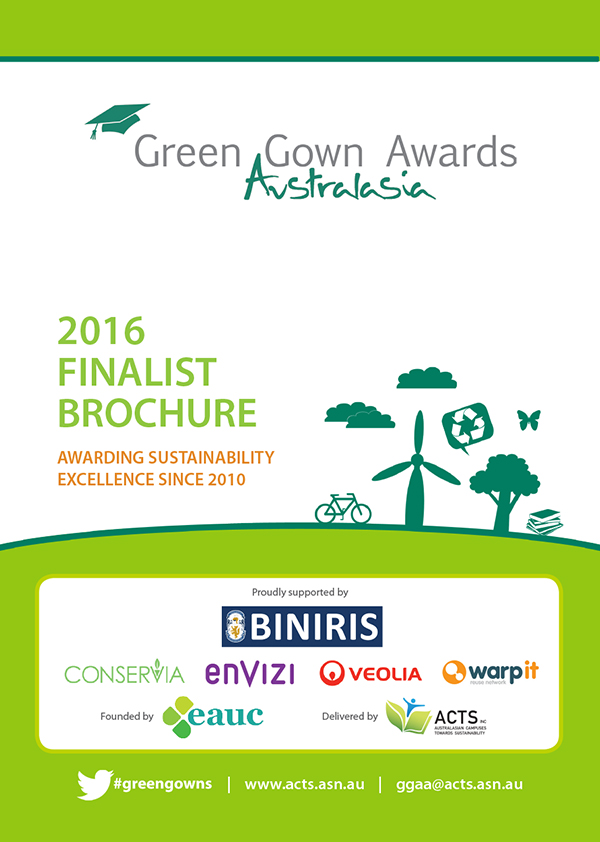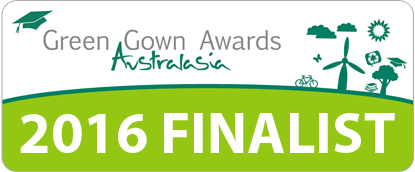2016
Thursday 3 November
Sunshine Coast, Queensland, Australia
34 finalists from 17 institutions
14 winners representing 9 institutions
Built Environment
W I N N E R
Monash University are Passive House Pioneers
Monash University has renovated a dilapidated asbestos clad warehouse at the Clayton campus into an innovative energy efficient, vibrant and comfortable open office space for their Buildings and Property Division. The building uses Passive House design principles to create an office space which has a low energy demand, high indoor environmental quality and a rooftop 70 kWp solar array. The solar array currently generates 63% of the building’s energy requirement. Through building tuning and behaviour change measures, Monash is working towards further reducing the energy demand to achieve energy neutrality. This project is one of the first large office buildings in Australia to aim for Passive House performance and energy neutrality.
Carbon Reduction
W I N N E R
Just like the Swiss, we are officially neutral!
CSU is the first, and currently the only, university in Australia to achieve certified carbon neutrality. We are one of only 23 Australian organisations to be officially recognised for reaching this national standard. We have continued our downward trend in greenhouse gas emissions over the past nine years from 177 kg CO2-e per square metre in 2011 to zero in 2015. CSU sought Carbon Neutrality status through the National Carbon Offset Standard (NCOS) administered by the Department of Environment (DOE). As defined by the DOE, Carbon Neutrality is achieved when “Net greenhouse gas emissions of an organisation, a product, service or event are equal to zero”.
H I G H L Y C O M M E N D E D
Sustainable Urban Precincts Program
There’s a quiet green revolution taking place at RMIT in Melbourne, where a $98 million urban sustainability project – the biggest of its kind in the southern hemisphere – is underway. The Sustainable Urban Precincts Program, is a “once in a generation” opportunity for the University to achieve a fundamental shift in momentum toward true sustainability. The program will generate valuable intellectual capital, creating a ‘living laboratory’ which will accelerate skills development and enhance industry capabilities in sustainable urban futures.
Community Innovation
W I N N E R
Seeds of Change: Riverbank Restoration at The University of Queensland
By partnering with the university community, the State Government, and local NRM groups to plant around 12,000 native seedlings at UQ’s St Lucia campus, one of Brisbane’s busiest urban spaces, this project has restored habitat for threatened species (particularly birds) by creating wildlife corridors that offer food and shelter. It has also removed hundreds of kilograms of plastic waste from mangrove areas of the Brisbane river. The project is not only a useful case study for improving biodiversity in urban areas, but also represents a valuable community engagement opportunity for UQ: two of the three tree-planting stages were carried out by staff and student volunteers, and the restored riverbank presents UQ students and researchers with ongoing scope for ecology and environmental management learning, discovery and engagement.
H I G H L Y C O M M E N D E D
Tune in: making sustainability radio
THINK: Sustainability is a weekly radio program produced in collaboration with radio 2SER and the University of Technology Sydney (UTS) sustainability team, students, and faculties. Co-hosts Jake Morcom and Ellen Leabeater are young and engage listeners in their own personal journeys of exploration, discovery and participation. The tempo is up-beat, fun and solutions focused. Each 30 minute episode consists of three distinct stories, with the hosts linking interviews with experts to their own personal experience. Think waste to wealth, grids to growth. From what’s possible to what’s practical. THINK Sustainability. Every Sunday on 2SER 107.3 and on podcast.
Continuous Improvement – Institutional Change
W I N N E R
UTS Think.Green.Do
Over the past 10 years UTS has steadily improved its sustainability performance, with initiatives including integrating sustainability into high level strategic plans, strategies and policies; Green Star certified “living lab” buildings, the Think:Sustainability radio program and social equity programs. Through its research, teaching and learning, operations and community engagement, UTS has achieved successful outcomes and made significant progress towards sustainability by minimising its environmental impact, promoting social justice and maintaining financial viability.
Facilities & Services
W I N N E R
Driving the Future: Electric Vehicle Fast Charging at The University of Queensland
In early 2016, UQ installed Queensland’s first solar-powered electric vehicle (EV) fast-chargers. This infrastructure is free for staff, students and the general public to use in order to help encourage the uptake of EV travel. The Gatton campus fast-charger is now also making regional EV travel possible for the first time in Queensland. In the first three months of operation, the chargers have already been used hundreds of times, delivering 9,000km worth of energy – enough to drive from Brisbane to Perth and back. This has saved nearly 1,000 litres of fuel and over 1,700 kilograms of CO2-e.
Learning, Teaching & Skills
W I N N E R

SIPS of sustainability lead to lifelong addictions: Sustainability Integration Program for Students (SIPS)
One way the University of Tasmania embeds sustainability is via our Sustainability Integration Program for Students (SIPS), which is a best-practice example of place-based education recognised with institutional, national and professional awards. SIPS provides authentic student learning experiences via collaborative design of learning programs that address on-campus operational priorities. To date, SIPS has involved 76 projects, 975 students, 32 staff, 12 discipline areas and all Tasmanian campuses. Through curricular, extra-curricular and research projects, SIPS engages students by guiding input to solutions for real-life challenges. Via SIPS, students develop and use disciplinary skills to highlight positive sustainability impacts of their learning.
Student Engagement
W I N N E R
Going Green @ Waikato: 4 students
Going Green @ Waikato encompasses many aspects of sustainability, especially student engagement, which plays a key part in our sustainability journey, via research, course work, quirky projects, community outreach, volunteering and competitions. We have delivered projects as diverse as: community gardens and worm farming, waste audits, building of solar powered composters, fun educational films, Zombies!, ecological education with schools, junk to art, surveys, and a student run Eco Emporium. Approx. 3000 students have been engaged and involved. These projects occurred 2013-2016.
H I G H L Y C O M M E N D E D
A Source of Inspiration: Source Community Wholefoods as a playground for student engagement with sustainability
Source is a not for profit sustainability cooperative. Established by a group of Geography and Environmental Studies students, Source is a wholefoods cooperative, bustling café, educational centre, and creative playground for students to come together (with each other, academics, professional staff and the community) to discuss and create new sustainability ideas and projects.
Leadership
W I N N E R
John Dewar
Professor John Dewar commenced the role of Vice-Chancellor and President of La Trobe University in January 2012. Since this time, he has successfully let a major organisational change program, transitioning the University to a financially sustainable operating model; developed and implemented the University’s Future Ready strategy and supporting Sustainability Plan; embedded the ‘sustainability thinking’ essential across all undergraduate coursework; established sustainability-focused research focus areas in food security and social justice; replaced 30% of the University’s fleet vehicles with GoGet car sharing vehicles for use by staff and students; successfully lobbied the Victorian government for a dedicated express bus from the Reservoir train station to the Melbourne campus; and drove the University’s commitment to divest from the top 200 coal, oil and gas companies within five years. Professor Dewar shows extraordinary leadership and commitment to sustainability in all aspects of teaching and learning, research and operations at La Trobe University.
ACTS Award of Excellence – Staff
W I N N E R

Danielle Rostan-Herbert,
Throughout her role as Sustainability Manager, now as Sustainability and Environmental Services Manager, Danielle has shown leadership in sustainability not just within her immediate team, but throughout the University and other tertiary networks. Danielle plays an important role in the University of Melbourne’s Sustainability strategy and is responsible for University-wide targets to reduce energy, carbon, water and waste.
H I G H L Y C O M M E N D E D

Daisy Amanaki
Daisy Amanaki has worked in the UTS IT department for 20 years and recently coordinated the donation of three shipping containers of classroom furniture and equipment to schools in the Cook Islands. Working entirely in a volunteer capacity she initiated the project, liaised with the Department of Education in the Cook Islands to broker the formal agreement, developed a crowd-sourced fundraising website to help cover shipping costs, and co-ordinated community and student volunteers to pack the shipping containers. With triple bottom line benefits the project diverted material from landfill, provided five schools with new furniture, and improves the educational prospects for kids in the Pacific.
ACTS Award of Excellence – Student
W I N N E R
Emily Newtown
Emily is an active advocate for holistic sustainability. Prolific in her endeavours both on and off campus, Emily volunteers in the community, studies in the Master of Environment program, and works in the Sustainability Team at the University of Melbourne. With a particular focus on waste education, she enjoys showing people the true impact of their consumption and waste. Emily has demonstrated a relentless desire to go above and beyond what’s expected of her. Planting trees, cleaning beaches, auditing waste for her local council and the University, organising events to promote Fair Trade, as well as programs to increase re-usable coffee cups.
Media
The 2016 Green Gown Awards Australasia was proudly sponsored by:













